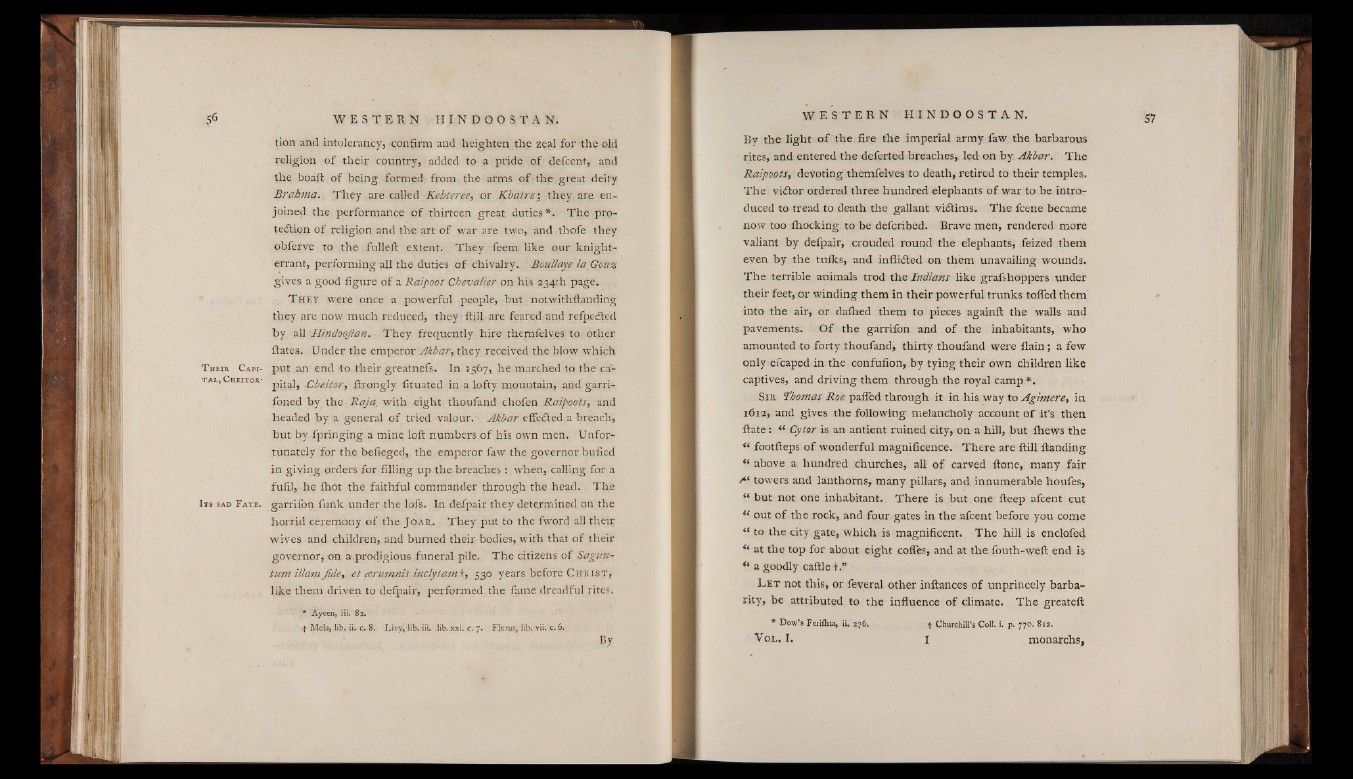
T h e i r C a p i t
a l , C h e i t o r *
I t s s a d F a t e .
tion and intolerancy, confirm and heighten the zeal for the old
religion of their country, added to a pride of defcent, and
the boaft of being formed from the arms o f the great deity
Brahma. They are called Kehteree, or Khatre; they are enjoined
the performance of thirteen great duties*. The protection
o f religion and the art of war are two, and thofe they
ohferve to the fulleft extent. They feem like our knight-
errant, performing all the duties o f chivalry. Boullaye la Gouz
gives a good figure of a Raipoot Chevalier on his 234th page.
T h e y were once a powerful people, but notwithftanding
they are now much reduced, they1 ftill are feared and refpedted
by all Hindoojlan. They frequently hire themfelves to other
ftates. Under the emperor Akbar, they received the blow which
put an end to their greatnefs. In 1567,. he marched to the capital
» ■Cheitor, ftrongly fituated in a lofty mountain, and garri-
foned by the Raja, with eight thoufand chofen Raipoots, and
headed by a general o f tried valour. Akbar effedted a breach,
but by fpringing a mine loft numbers of his own men. Unfortunately
for the belieged, the emperor faw the governor bulled
in giving orders for filling up the breaches : when, calling for a
fufil, he lhot the faithful commander through the head. The
garrifon funk under the lofs. In defpair they determined on the
horrid ceremony of the Jo AH . They put to the fword all their
wives and children, and burned their bodies, with that of their
governor, on a-.prodigious funeral pile. The citizens of Sagun-
tum illamfide, et arumnis inclytamk, 530 years before C h r i s t ,
like them driven to defpair, performed the fame dreadful rites.
# Ayeen, in. 82.
Mela, lib. ii, q. 8. Livy, lib, iii. lib. xxi. c. 7. Floras, lib. vii. c. 6.
By
By the light o f the fire the imperial army faw the barbarous
rites, and entered the deferted breaches, led on by Akbar. The
Raipoots, devoting themfelves to death, retired to their temples.
The viCtor ordered three hundred elephants o f war to be introduced
to tread to death the gallant victims. The fcene became
now too ihocking to be defcribed. Brave men, rendered more
valiant by defpair, crouded round the elephants, feized them
even by the tuiks, and inflicted on them unavailing wounds.
The terrible animals trod the Indians like grafshoppers under
their feet, or winding them in their powerful trunks toiled them
into the air, or daihed them to pieces againft the walls and
pavements. Of the garrifon and o f the inhabitants, who
amounted to forty thoufand, thirty thoufand were ilain ; a few
only eleaped in the confufion, by tying their own children like
captives, and driving them through the royal camp *.
S i r Thomas Roe palled through it in his way to Agimere, in
1612, and gives the following melancholy account o f it’s then
ftate : “ Cytor is an antient ruined city, on a hill, but ihews the
<l footfteps o f wonderful magnificence. There are ftill ftanding
“ above a hundred churches, all o f carved ftone, many fair
towers and lanthorns, many pillars, and innumerable houfes,
“ but not one inhabitant. There is but one fteep afcent cut
“ out of the rock, and four gates in the afcent before you come
“ to the city gate, which is magnificent. The hill is enclofed
*l at the top for about eight cofles, and at the fouth-weft end is
“ a goodly calile t.”
L e t not this, or feveral other inftances o f unprincely barbarity,
be attributed to the influence of climate. The greateft
* Dow’s Ferlflita, ¡¡.'276. f Churchill’s Coll. i. p. 770. 812.
V o l . I. i monarchs,